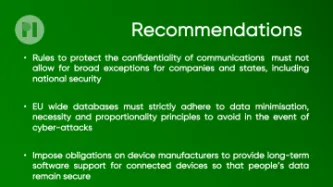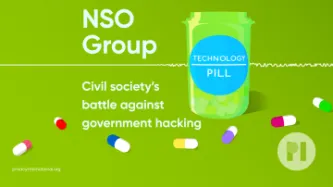Search
Content type: Advocacy
PI Opening Statement at PEGA Hearing on "Spyware and ePrivacy"
[check against delivery]
Thank you very much for offering us the opportunity to give evidence before this Committee for a second time.
Privacy International (PI) is a London-based non-profit that researches and advocates globally against government and corporate abuses of data and technology. For years we have been tracking the surveillance industry, challenging unlawful surveillance before national courts as well as the Court of…
Content type: Report
End-to-end encryption (E2EE) contributes significantly to security and privacy. For that reason, PI has long been in favour of the deployment of robust E2EE.Encryption is a way of securing digital communications using mathematical algorithms that protect the content of a communication while in transmission or storage. It has become essential to our modern digital communications, from personal emails to bank transactions. End-to-end encryption is a form of encryption that is even more private.…
Content type: Examples
Just as China uses technology system called "Integrated Joint Operations Platform" to control and surveil the persecuted population of Uighurs while restricting their movement and branding dissent as "terrorism", the Israeli military is using facial recognition and a massive database of personal information to control millions of Palestinians in the occupied West Bank. In November 2021, NSO Group's Pegasus spyware was found on the phones of six Palestinian human rights activists, three of whom…
Content type: Examples
The Israeli minister of public security has joined police in denying claims in an article in Calcalist that the country's police force have used NSO Group's Pegasus software to spy on the phones of people who led protests against former premier Benjamin Netanyahu. Calcalist reported that the surveillance was carried out without court supervision or oversight of how the data was used. The daily Haaretz newspaper also reported that it had seen a 2013 invoice in which NSO billed police @@2.7…
Content type: Video
Links
Edin mentioned 'a journalist and her son' being targeted; their names are Carmen and Emilio Aristegui. You can find out more about people targeted in Mexico
Keep up to date with ongoing litigation against NSO Group around the globe
Read our report, together with Amnesty International and SOMO, on NSO Group's corporate structure
Find more examples of harm involving NSO group
As revelations about the abuses of NSO Group's spyware continue, we took a look at what…
Content type: Long Read
Miguel Morachimo, Executive Director of Hiperderecho. Hiperderecho is a non-profit Peruvian organisation dedicated to facilitating public understanding and promoting respect for rights and freedoms in digital environments.The original version of this article was published in Spanish on Hiperderecho's website.Where does our feeling of insecurity come from? As we walk around our cities, we are being observed by security cameras most of the time. Our daily movement, call logs, and internet…
Content type: News & Analysis
It's a big question, have you purchased a card for your local surveillance camera on Surveillance Camera Day?
Yes, Surveillance Camera Day is a real thing and happens on 20 June.
Perhaps your local community could create a bingo card to see who knows where all the local cameras are. Are there any on your local bins, how about the lampposts or a billboard?
Have you had a facial recognition van in your local community? Did you see the police helicopter crew video camera…
Content type: News & Analysis
One of the UK’s largest telecommunications operators, BT, has said to Privacy International that a report claiming it “co-produces malware” with a surveillance company for the GCHQ is inaccurate – but hasn’t said why or given any more details.
The accusation was made by C5IS – a shadowy online publication claiming to be “the most widely read source of information on surveillance technologies”. In its Big Black Book of Electronic Surveillance, it claims that SS8, a…
Content type: News & Analysis
Privacy International has joined a global coalition of privacy campaigners, tech companies, and technology experts to respond to proposals by British intelligence chiefs aimed at allowing them access to encrypted messaging apps such as WhatsApp or Signal.
If implemented, the proposals would allow government authorities to force messaging platforms to silently add a law enforcement participant to a group chat or call.
Such a capability poses serious threats to…
Content type: Long Read
Details of case:
R (on the application of Privacy International) (Appellant) v Investigatory Powers Tribunal and others (Respondents)
[2019] UKSC 22
15 May 2019
The judgment
What two questions was the Supreme Court asked to answer?
Whether section 67(8) of RIPA 2000 “ousts” the supervisory jurisdiction of the High Court to quash a judgment of the Investigatory Powers Tribunal for error of law?
Whether, and, if so, in accordance with what principles, Parliament may by…
Content type: Press release
Today, after a five year battle with the UK government, Privacy International has won at the UK Supreme Court. The UK Supreme Court has ruled that the Investigatory Powers Tribunal’s (IPT) decisions are subject to judicial review in the High Court. The Supreme Court's judgment is a major endorsement and affirmation of the rule of law in the UK. The decision guarantees that when the IPT gets the law wrong, its mistakes can be corrected.Key point:UK Supreme Court rules that the UK spying tribunal…
Content type: News & Analysis
Privacy International welcomes WhatsApp's immediate reaction after the revelation that Israeli cyber intelligence company NSO group had exploited a vulnerability in their software. We encourage all WhatsApp users to update their app as soon as possible. However, we believe WhatsApp needs to be much more transparent with their users. We haven't seen a notification on the app itself that would inform users about both, the bug, and the fix. The current version merely states that you can now see…
Content type: Long Read
Imagine that every time you want to attend a march, religious event, political meeting, protest, or public rally, you must share deeply personal information with police and intelligence agencies, even when they have no reason to suspect you of wrongdoing.
First, you need to go to the police to register; have your photo taken for a biometric database; share the contacts of your family, friends, and colleagues; disclose your finances, health records, lifestyle choices, relationship status, and…
Content type: News & Analysis
Federal law enforcement is deploying powerful computer hacking tools to conduct domestic criminal and immigration investigations.
By Alex Betschen, Student Attorney, Civil Liberties & Transparency Clinic, University at Buffalo School of Law
Hacking by the government raises grave privacy concerns, creating surveillance possibilities that were previously the stuff of science fiction. It also poses a security risk, because hacking takes advantage of unpatched vulnerabilities in our…
Content type: Press release
FOR IMMEDIATE RELEASE
December 21, 2018
CONTACTS:
Alex Betschen, Civil Liberties & Transparency Clinic, [email protected], 716–531–6649
Colton Kells, Civil Liberties & Transparency Clinic, [email protected], 585–766–5119
Abdullah Hasan, ACLU, [email protected], 646–905–8879
NEW YORK — Privacy International, the American Civil Liberties Union, and the Civil Liberties & Transparency Clinic of the University at Buffalo School of Law filed a lawsuit today…












